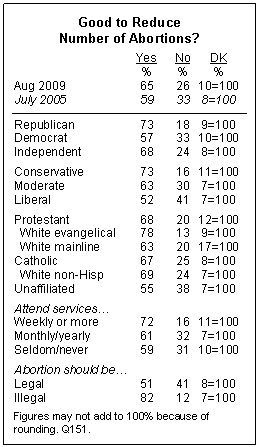Broad-based Decline in Support for Legal Abortion
Recently, Americans have become more opposed to legal abortion. New analysis of combined Pew Research Center surveys conducted over the past three years shows that in 2007 and 2008, supporters of abortion rights clearly outnumbered opponents of abortion (those saying it should be illegal in most or all cases) by a 54%-40% margin. By contrast, in two major surveys conducted in 2009 among a total sample of more than 5,500 adults, views of abortion are about evenly divided, with 47% expressing support for legal abortion and 44% expressing opposition.
Republicans and Republican-leaning political independents have each become less pro-choice and more pro-life in recent polling. Democrats have also become less pro-choice, though by a somewhat smaller margin (four points less supportive of legal abortion). Democrats have not become more opposed to abortion; rather, they are now more likely to be undecided about the issue as compared with 2007/2008.
The 2009 polls find that gender differences now exist among Democrats. Among Democratic men, support for legal abortion has dropped nine percentage points from 2007/2008 to 2009 (62% to 53%) while support is unchanged among Democratic women (65% in 2007/2008 vs. 64% in 2009). This means that a significant gender gap over abortion now exists among Democrats, with Democratic women expressing more support for abortion rights than Democratic men (64% vs. 53%).
Among religious groups, observant white mainline Protestants and white Catholics (i.e., those who attend worship services at least weekly) each exhibit double-digit declines in support for legal abortion, as do Jews and less-observant white evangelical Protestants. By contrast, the views of black Protestants and the religiously unaffiliated have held steady.
Declines in support for legal abortion are seen among a wide variety of demographic groups. For example, both men and women currently express less support for legal abortion than they did in 2007/2008. Similarly, both whites and Hispanics have become significantly less pro-choice. But while whites have become significantly more pro-life, the movement among Hispanics has been primarily into the undecided camp.

The analysis also shows that some groups that once clearly preferred keeping abortion legal are now divided over whether it should be legal or not. For instance, Pew Research Center surveys from 2007/2008 found that men, whites, those age 30-49, those with some college education, political independents, observant white mainline Protestants, Catholics and Midwesterners all clearly favored keeping abortion legal in most or all cases. Now, each of these groups is closely divided on the issue.
Similarly, several groups that were previously divided in their views on abortion now come down clearly on the pro-life side. Among Hispanics, seniors, those with a high school education or less, Southerners and less-observant white evangelicals, abortion opponents now outnumber supporters of abortion rights.
Other Restrictions on Abortion

The latest (August 2009) Pew Research Center survey also finds that four-in-ten Americans (41%) now favor making it more difficult for a woman to get an abortion, up six points from 2007 (35%) and the highest level of support in Pew Research Center surveys for increased restrictions since 1987. However, those who favor making it more difficult to obtain an abortion are still outnumbered by those who oppose making it more difficult (50% vs. 41%).
Support for putting up barriers to abortion varies substantially across political and religious groups. Fully 65% of conservative Republicans want to make abortions harder to get, but just 39% of independents and 19% of liberal Democrats say the same. Almost two-thirds of white evangelical Protestants (64%) back greater restrictions on abortion, but fewer than half as many white mainline Protestants (27%) and the religiously unaffiliated (23%) say the same. Catholics fall in between, with 44% in support of more restrictions on abortion.

Those who attend worship services more often are also more apt to favor restrictions on abortion. A slight majority of those who attend church at least weekly (53%) favor more restrictions, compared with 37% of those who attend monthly or yearly and 28% of those who seldom or never attend.
When it comes to specific restrictions, Americans overwhelmingly support requiring women under age 18 to get the consent of at least one parent before having an abortion (76%), a figure that is largely unchanged in recent years. Large majorities of conservative Republicans (89%), white evangelicals (83%) and opponents of legal abortion (83%) express support for parental consent laws. But support for parental consent legislation is high even among those groups whose members are more supportive of abortion rights. For example, large majorities of the religiously unaffiliated (64%), mainline Protestants (77%) and Catholics (81%) favor requiring parental consent. Even among those who say abortion should be legal in most or all cases, 71% favor requiring parental consent.

Reducing the Number of Abortions
Apart from opinions on whether abortion should be legal, two-thirds of Americans (65%) say it would be good to reduce the number of abortions performed in the U.S., compared with 26% who say they don’t feel this way. Support for reducing abortions is up from 2005, when 59% said they would like to see fewer abortions.

Reducing abortions is popular among groups who are least supportive of legal abortion, including 73% of conservatives, 78% of white evangelical Protestants and 72% of those who attend weekly religious services. But even among groups that generally favor legal abortion, most also say it would be good to reduce the number of abortions. This includes 57% of Democrats, 55% of those unaffiliated with a religion, 59% of those who rarely or never attend worship services and 51% of those who say that abortion should be legal in most or all cases.
Photo credit: Corbis


